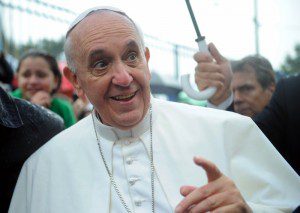I read the whole thing a short while ago. There are innumerable riches here, and a fabulous integrated treatment of environmental / resource problems. This will clearly become the definitive Christian statement on the topic. For too long, Christians have been accused of being (or, too often, actually were in practice) indifferent to the problems of the earth and the environment: as if we merely want to exploit the earth and her resources, rather than (the biblical view) being stewards of God’s marvelous creation. I think this encyclical will go a long way towards dispelling those notions. The secularists don’t “own” this discussion, anymore than they own economic or demographic or “nature of the marriage and family” discussions. Along these lines, the Holy Father observed:
An inadequate presentation of Christian anthropology gave rise to a wrong understanding of the relationship between human beings and the world. Often, what was handed on was a Promethean vision of mastery over the world, which gave the impression that the protection of nature was something that only the faint-hearted cared about. Instead, our “dominion” over the universe should be understood more properly in the sense of responsible stewardship. [116]
Once we start to think about the kind of world we are leaving to future generations, we look at things differently; we realize that the world is a gift which we have freely received and must share with others. Since the world has been given to us, we can no longer view reality in a purely utilitarian way, in which efficiency and productivity are entirely geared to our individual benefit. Intergenerational solidarity is not optional, but rather a basic question of justice, since the world we have received also belongs to those who will follow us. [159]
. . . a mistaken understanding of our own principles has at times led us to justify mistreating nature, to exercise tyranny over creation, to engage in war, injustice and acts of violence, . . . [200]
It must be said that some committed and prayerful Christians, with the excuse of realism and pragmatism, tend to ridicule expressions of concern for the environment. Others are passive; they choose not to change their habits and thus become inconsistent. So what they all need is an “ecological conversion”, whereby the effects of their encounter with Jesus Christ become evident in their relationship with the world around them. Living our vocation to be protectors of God’s handiwork is essential to a life of virtue; it is not an optional or a secondary aspect of our Christian experience. [217]
[W]e are not disconnected from the rest of creatures, but joined in a splendid universal communion. [220]
I particularly like the Holy Father’s emphasis on blending and harmonizing Catholic “environmental” and social teaching:
There can be no ecology without an adequate anthropology. [118]
Today, the analysis of environmental problems cannot be separated from the analysis of human, family, work-related and urban contexts, nor from how individuals relate to themselves, which leads in turn to how they relate to others and to the environment. There is an interrelation between ecosystems and between the various spheres of social interaction, . . . [141]
He “humanizes” and “Christianizes” important scientific discussions that are usually hyper-secularized in the false dichotomy habitually drawn between science and God. I love that! It’s a direct “punch to the nose” to a ludicrously compartmentalized and intellectually bankrupt secularism and excessive scientism (i.e., a materialistic version of science that is logically self-defeating, given the origin and history of that same science: which was overwhelmingly theistic):
It cannot be maintained that empirical science provides a complete explanation of life, the interplay of all creatures and the whole of reality. This would be to breach the limits imposed by its own methodology. If we reason only within the confines of the latter, little room would be left for aesthetic sensibility, poetry, or even reason’s ability to grasp the ultimate meaning and purpose of things. [199]
Dialogue among the various sciences is likewise needed, since each can tend to become enclosed in its own language, while specialization leads to a certain isolation and the absolutization of its own field of knowledge. This prevents us from confronting environmental problems effectively. An open and respectful dialogue is also needed between the various ecological movements, among which ideological conflicts are not infrequently encountered. [201]
Environmental education should facilitate making the leap towards the transcendent which gives ecological ethics its deepest meaning. [210]
Then too, there is the recognition that God created the world, writing into it an order and a dynamism that human beings have no right to ignore. [221]
The universe unfolds in God, who fills it completely. Hence, there is a mystical meaning to be found in a leaf, in a mountain trail, in a dewdrop, in a poor person’s face. The ideal is not only to pass from the exterior to the interior to discover the action of God in the soul, but also to discover God in all things. [233]
Standing awestruck before a mountain, he or she cannot separate this experience from God, and perceives that the interior awe being lived has to be entrusted to the Lord . . . [234]
He takes on unisexism as well:
[V]aluing one’s own body in its femininity or masculinity is necessary if I am going to be able to recognize myself in an encounter with someone who is different. In this way we can joyfully accept the specific gifts of another man or woman, the work of God the Creator, and find mutual enrichment. It is not a healthy attitude which would seek “to cancel out sexual difference because it no longer knows how to confront it”. [155]
He (quite appropriately and relevantly) ties in the incarnation and eucharistic theology with environmentalism:
For Christians, all the creatures of the material universe find their true meaning in the incarnate Word, for the Son of God has incorporated in his person part of the material world, planting in it a seed of definitive transformation. [235]
It is in the Eucharist that all that has been created finds its greatest exaltation. Grace, which tends to manifest itself tangibly, found unsurpassable expression when God himself became man and gave himself as food for his creatures. The Lord, in the culmination of the mystery of the Incarnation, chose to reach our intimate depths through a fragment of matter. . . . Joined to the incarnate Son, present in the Eucharist, the whole cosmos gives thanks to God. . . .The Eucharist joins heaven and earth; it embraces and penetrates all creation. The world which came forth from God’s hands returns to him in blessed and undivided adoration . . . [236]
He even includes a magnificent passage on the Blessed Virgin Mary:
Mary, the Mother who cared for Jesus, now cares with maternal affection and pain for this wounded world. Just as her pierced heart mourned the death of Jesus, so now she grieves for the sufferings of the crucified poor and for the creatures of this world laid waste by human power. Completely transfigured, she now lives with Jesus, and all creatures sing of her fairness. She is the Woman, “clothed in the sun, with the moon under her feet, and on her head a crown of twelve stars” (Rev 12:1). Carried up into heaven, she is the Mother and Queen of all creation. In her glorified body, together with the Risen Christ, part of creation has reached the fullness of its beauty. She treasures the entire life of Jesus in her heart (cf. Lk 2:19,51), and now understands the meaning of all things. Hence, we can ask her to enable us to look at this world with eyes of wisdom. [241]
I very much resonate with the pope’s social ideas, since I am a distributist (“Let us keep in mind the principle of subsidiarity, which grants freedom to develop the capabilities present at every level of society, while also demanding a greater sense of responsibility for the common good from those who wield greater power” [196] ), and critic of the many excesses of corporate capitalism and materialism (“profit cannot be the sole criterion to be taken into account” [187] / “nor should the economy be subject to the dictates of an efficiency-driven paradigm of technocracy” [189] ), as well as the evils of Marxism and Communism (and pollution, strip mining, etc.). I’m also a strong critic of anti-child contraceptive mentalities, and (obviously) pro-life, as any Catholic should and must be.
The pope refused to ignore the wholesale slaughter of preborn human beings:
Since everything is interrelated, concern for the protection of nature is also incompatible with the justification of abortion. How can we genuinely teach the importance of concern for other vulnerable beings, however troublesome or inconvenient they may be, if we fail to protect a human embryo, even when its presence is uncomfortable and creates difficulties? [120]
Is it not the same relativistic logic which justifies buying the organs of the poor for resale or use in experimentation, or eliminating children because they are not what their parents wanted? [123]
The mindset which leaves no room for sincere concern for the environment is the same mindset which lacks concern for the inclusion of the most vulnerable members of society. [196]
I am a passionate nature lover and conservationist, and very concerned with the preservation of nature’s beautiful resources. My actual views are often in stark contrast with the gross and slanderous caricatures of some (online; several, former friends or supposedly friends) who have sadly made themselves my “enemies.”
I’ve been absurdly accused of being “more Republican than Catholic” and a “neo-conservative” etc. (not to mention, a supposed “defender” or “advocate” of torture: something that has never been true at any time). Nothing could be further from the truth. I am in many ways what is called a political conservative, but I’m also a distributist and strong advocate of Catholic “third way” social teaching. I can’t be cynically put into a box that I am not in fact in. The Church is infinitely more so a guide to my worldview and approach to life and thought than any flawed, always-compromised-in-some-way mere political party would or could ever be. My positive reaction to this encyclical is but one of innumerable indications of my true positions on issues.
In the next two weeks, for example, I will be visiting the magnificent Redwood trees on the coast of California. These forests are but 10% as large as they used to be. Someone got wise and took efforts to preserve the small remnants of the once vast forest. The national forest system gathers needed resources of lumber without destroying the ecosystems in the forests. We have learned about how to respectfully treat mother nature and mother earth. I visit old-growth forests in every state where I can find them. Often, they are just a few acres in areas that were once completely covered with these primeval forests.
Since it is the hot-button issue usually coupled to analysis of this encyclical (from many folks, even before they have read it), I note in passing that I disagree with a very tiny portion of it: the section about global warming (I disagreed with virtually nothing else, upon first reading). “Warming” is mentioned only nine times in the entire encyclical. This is a question of scientific “facts” and interpretations, that have nothing to do directly with the Catholic faith or the magisterium; hence, a Catholic is completely at liberty to respectfully disagree. Briefly summarized, this is my position:
1. There are indeed some real and verifiable changes in climate and the global environment in recent years.
2. Global warming is a myth. The actual temperature data regarding the entire earth shows no temperature gain over the last twenty years or so: in stark contrast to the previous alarmist predictions. This is an indisputable fact; not mere speculation or theory. The doom-and-gloom prophets have been wrong again and again; including, e.g., dire warnings about population growth and inability to feed ourselves. Al Gore stated in 2000 or so that the polar ice cap (surrounding the north pole) would be no more by now. It is in fact flourishing and growing. There simply is no discernible “trend of global warming” [167; also, 175]. With all due respect, the pope is mistaken in this regard.
3. It is highly questionable (based on various scientific evidences) that man is primarily or even significantly responsible for these changes (by use of fossil fuels, etc.). Many scientists believe that they are almost entirely the result of the natural cycles of nature.
4. It is highly questionable (based on various scientific evidences) that climate change will be catastrophic anytime soon, if ever.
Another quibble I would have is the absence of an espousal of nuclear energy, which is a very practical and attainable alternative to fossil fuels (which are blamed for much in the encyclical). It is mentioned in passing, twice: negatively (section 184) and semi-negatively (104). This appears to presuppose the leftish opposition to nuclear energy, which is “dissed” almost without argument anymore. Thus, one prime, existing alternative to what is deemed (rightly or wrongly) to be one of the primary environmental “problems” is ruled out from the outset.
Pope Francis wrote:
There are certain environmental issues where it is not easy to achieve a broad consensus. Here I would state once more that the Church does not presume to settle scientific questions or to replace politics. But I am concerned to encourage an honest and open debate so that particular interests or ideologies will not prejudice the common good. [188]
I urge everyone to read and digest this wonderful and positively innovative encyclical. It’s a goldmine of wisdom. I could easily quote 200 parts of it as especially noteworthy and “quoteworthy.” Here are a few examples of its innumerable gems of insight:
113. . . . [H]umanity has changed profoundly, and the accumulation of constant novelties exalts a superficiality which pulls us in one direction. It becomes difficult to pause and recover depth in life. If architecture reflects the spirit of an age, our megastructures and drab apartment blocks express the spirit of globalized technology, where a constant flood of new products coexists with a tedious monotony. Let us refuse to resign ourselves to this, and continue to wonder about the purpose and meaning of everything. Otherwise we would simply legitimate the present situation and need new forms of escapism to help us endure the emptiness.
114. All of this shows the urgent need for us to move forward in a bold cultural revolution. Science and technology are not neutral; from the beginning to the end of a process, various intentions and possibilities are in play and can take on distinct shapes. Nobody is suggesting a return to the Stone Age, but we do need to slow down and look at reality in a different way, to appropriate the positive and sustainable progress which has been made, but also to recover the values and the great goals swept away by our unrestrained delusions of grandeur.
Since the market tends to promote extreme consumerism in an effort to sell its products, people can easily get caught up in a whirlwind of needless buying and spending. Compulsive consumerism is one example of how the techno-economic paradigm affects individuals. Romano Guardini had already foreseen this: “The gadgets and technics forced upon him by the patterns of machine production and of abstract planning mass man accepts quite simply; they are the forms of life itself. To either a greater or lesser degree mass man is convinced that his conformity is both reasonable and just”. This paradigm leads people to believe that they are free as long as they have the supposed freedom to consume. [203]
The emptier a person’s heart is, the more he or she needs things to buy, own and consume. [204]
Many people know that our current progress and the mere amassing of things and pleasures are not enough to give meaning and joy to the human heart, yet they feel unable to give up what the market sets before them. [209]
If someone has not learned to stop and admire something beautiful, we should not be surprised if he or she treats everything as an object to be used and abused without scruple. [215]
A constant flood of new consumer goods can baffle the heart and prevent us from cherishing each thing and each moment. To be serenely present to each reality, however small it may be, opens us to much greater horizons of understanding and personal fulfilment. Christian spirituality proposes a growth marked by moderation and the capacity to be happy with little. It is a return to that simplicity which allows us to stop and appreciate the small things, to be grateful for the opportunities which life affords us, to be spiritually detached from what we possess, and not to succumb to sadness for what we lack. This implies avoiding the dynamic of dominion and the mere accumulation of pleasures. [222]
[N]o one can cultivate a sober and satisfying life without being at peace with him or herself. An adequate understanding of spirituality consists in filling out what we mean by peace, which is much more than the absence of war. [225]
Here is the URL of the encyclical on the Holy See website.
Read it for yourself! We can do that now. It’s easier than ever. Let the Holy Father in his great wisdom and charity guide you. You don’t need apologists like myself to be your interpreter, if you can read and think for yourself. Perhaps this post can be a sort of general introduction, but no more than that. We need to read and ponder and digest his words; not have them spoon-fed to us through the multiple filters of the secular media (or the equally ridiculous histrionics of the radical Catholic reactionary crowd), or apologists or Catholic journalists, or anyone with a blog and an opinion. The very notion of any of those scenarios is a farce.
You will be edified and enriched beyond measure.

















